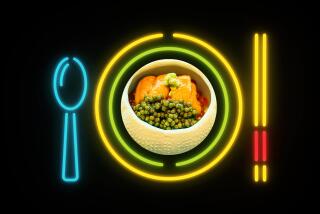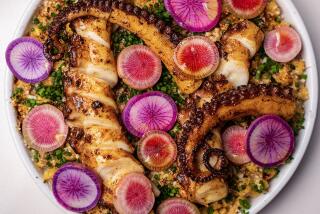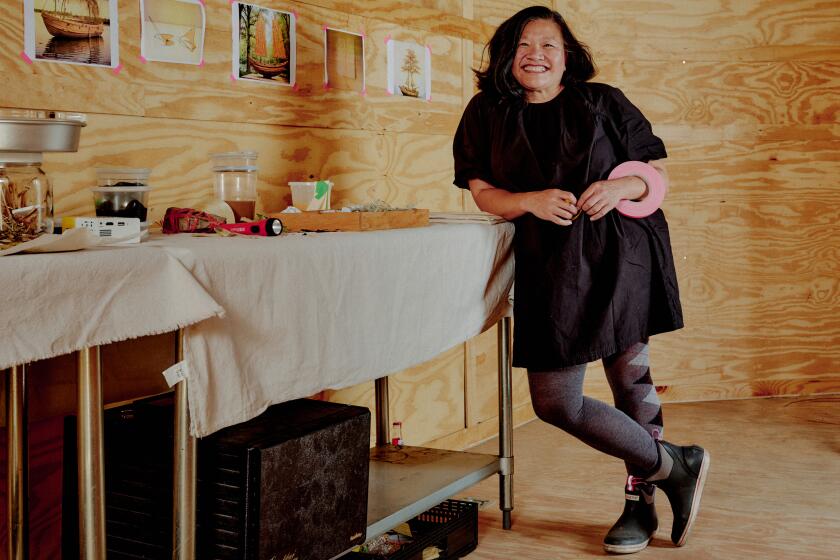RESTAURANT REVIEW : Russian House the Summit of Soviet Cuisine
We missed the Gypsy show at the Russian House, but we didn’t miss the Gypsies. They clustered around the stage in their crimson costumes, waiting for the Russian singer to finish her act, and we wished we hadn’t bought our tickets to “La Femme Nikita” in advance. Here was all the Russian atmosphere you could want.
There’s always music at the Russian House, and it’s always in a minor key. On weekends the entertainment (singer, keyboardist and drummer) is live, and the rest of the time a variety of mournful Russian pop ballads are piped in. Life is hard in Russia. Maybe that’s why all their songs are so melancholic.
Maybe that’s also why Russian restaurants tend to look like speak-easies. This room actually has plenty of natural light available, but either patrons or management prefers to keep the windows tightly shuttered. Most of the illumination comes from a flashing string of round lights that frames the stage, bouncing off the red tablecloths and pink napkins like Baryshnikov doing an entrechat.
Like the atmosphere, the food at the Russian House is heavy, but most of it tastes better than you have a right to expect. Chef Klava Borodina has put together a sort of pan-Soviet menu, with dishes from the Ukraine, Georgia, Armenia, the Baltics and even Central Asia.
The soups are one course I won’t soon forget. There’s a hearty borscht and a matzo-ball soup that pays homage to Soviet Jews, but it’s the other two I’d come back for.
One is kharcho (spelled “harchoe” on the menu), a thick soup-stew made of big chunks of lamb with rice, mint, cilantro, garlic and parsley, and it’s magnificent. I had it on a Wednesday evening when the place was dead empty, and I wished the room could be full of people eating it. It’s a classic Georgian dish, although the waiter may insist that it’s Uzbeki.
Then there’s the one they call royal ukha, a salmon and potato soup loaded with dill. Anyone who has eaten Scandinavian food will recognize the genre, but this soup is oilier and more substantial, and has stronger flavors. It comes in a little brown crock, and it’s terrific.
You’ll notice that Russians eat little snack dishes (zakuski) endlessly. The appetizer list here makes up well over half the menu, and there are many excellent choices. Just remember that if you weren’t born on the steppes, you’re going to need a large doggie bag.
Royal tarama is mentioned here mostly for its misleading name. Unlike Greek tarama, this dip contains no fish roe. It’s a creamy, characterless white dip made from eggplant, smeared out flat on a plate to be eaten with bread. The eggplant caviar (baklazhannaia ikra) is much better. This dip is burnished orange in color, full of the smoky flavor of red peppers and the sting of massive amounts of crushed garlic.
The classic hot dumplings pelmeni and vareniki are given rather cursory treatment, unfortunately. The pelmeni aren’t as juicy or delicate as these Siberian ravioli might be, but they do make an impression, since their meat stuffing seems to be mostly garlic. Vareniki, a Ukrainian specialty, are little pillows that can be filled with meat, cheese or potato. The ones here, with a soft potato filling and a sprinkling of fried onions on top, are quite bland.
The entrees are huge. They come with side dishes on gigantic platters as vast as Mother Russia herself, and will leave you wondering why you bothered to eat a first course. The sides are good in themselves: dill-encrusted roasted potatoes, a tangy shredded cabbage salad and what a Russian considers a real luxury--a whole sliced tomato.
Tabaka is great, a simple Cornish game hen flattened and grilled. The classic chicken Kiev, in contrast, has breading as thick as a winter coat and comes up a little dry. It’s served with sliced grapefruit, though, and the flavors, bizarre as it may seem, mingle intelligently.
The beef stroganoff is one of the best I’ve ever tasted--a riceless, ultracreamy version that made me quit after about four forkfuls. Like the pelmeni, kharcho and royal ukha, it’s served in a little brown crock. Watch for those crocks; everything that comes in them is devastating.
On the other hand, a dish chef Borodina calls royal pike baked in clams is just awful: dry pieces of fish with little overcooked shrimp in a cheesy sauce. So far as I can tell, the only clams are the three shells that serve as cocottes on the plate.
There is a long list of desserts, but I only got to taste one, ptitsa moloko (“bird’s milk”). It’s a rectangular slice of a chocolate-covered orange suspension--something between Jell-O and custard--with an artificial taste that reminded me of children’s cough syrup. The other desserts, it seems--Napoleons, ice creams and the like--are always sold out. Just like in Russia, nyet ?
Suggested dishes: kharcho, $2.95; royal ukha, $4.50; eggplant caviar, $5.50; beef stroganoff, $16; Cornish tabaka, $14.
The Russian House, 22864 Ventura Blvd . , Woodland Hills, (818) 348-5112. Dinner 6-10 p.m. Tuesday-Thursday and Sunday; 6 p.m.-midnight Fridays and Saturdays. Full bar. Parking lot. MasterCard and Visa accepted. Dinner for two, food only, $35-$50.
More to Read
Eat your way across L.A.
Get our weekly Tasting Notes newsletter for reviews, news and more.
You may occasionally receive promotional content from the Los Angeles Times.









